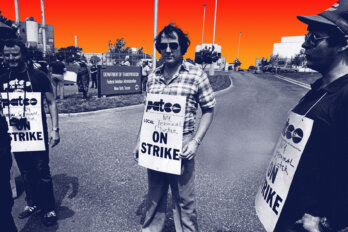After living in Vancouver for a year, Becca Young wanted to move back to Toronto with her husband, two-year-old son, and two cats. They looked for the right place for a couple of months and finally found it in a two-building condo complex near the waterfront. It was big enough for all of them, Young and her husband could walk to work, and there was a daycare nearby.
The couple moved in April 2018, and the trouble started soon after. As it turned out, they had chosen a complex that, according to the Toronto Star, had the most Airbnb listings of any building in the entire city—300. The couple quickly had to contend with the consequences. Those ranged from almost weekly fire-alarm pulls and elevator interruptions to loud parties and a wide variety of messes in the building’s common areas. There was even blood spatter in the lobby that stayed up for three days. “I always say that, when I close the door behind me, I love my building,” Young says. “But, between the front door and my apartment door, it’s pretty frigging awful.”
It got worse. In December, there was a shooting inside an Airbnb unit on a different floor, something that put Young and her husband on edge for weeks. “I kept having images of a bullet going through my son’s wall. He sleeps right next to the wall of the party unit.” A few months later, Young was verbally threatened by somebody after she tried to intervene with a man from the Airbnb unit next door who’d been shouting at a woman in the hallway. She and her husband have considered moving from the building, but the city’s increasingly hostile rental market made that idea a nonstarter. In April, they renewed their lease for another year.
With more than 6 million current listings worldwide and over half a billion bookings over the course of its decade-long history, Airbnb—reportedly worth almost $40 billion (US)—is one of Silicon Valley’s biggest success stories. The company is a boon for travellers looking for cheap lodgings and for local homeowners hoping to monetize their empty spaces. But, because its listings account for an overwhelming share of the overall short-term rental market, Airbnb has also exacerbated the severe lack of affordable housing in major cities around the world.
In Toronto, the company’s influence has become particularly contentious. For those who haven’t found their way onto the city’s property ladder, Airbnb is a malign force that cannibalizes housing that would otherwise be available to them. According to a 2017 paper from McGill’s Urban Politics and Governance research group, Airbnb has removed as many as 13,700 rental units from the market in Canada’s three largest metropolitan areas—all of which are dealing with extremely low vacancy rates. The impact on rents has, for many, been easy to track: according to PadMapper’s April 2019 Canadian Rental Report, the average one-bedroom apartment in Toronto costs $2,260 a month, up almost 11 percent from April 2018—and a staggering 27 percent from April 2017.
But for those who have managed to scramble onto a rung on that property ladder, Airbnb can help them hang on to it. According to Inside Airbnb, a website that aggregates publicly available data about the company’s activity in a variety of cities, a private room in Toronto generates $999 in estimated income per month, while an entire apartment yields $2,710—considerable sums for anyone trying to cover a mortgage. Exploitation of the system is rampant; namely, people and companies buying up multiple units simply to rent them out. As the Munk School of Global Affairs’s Lindsey Vodarek and Swathi Meenakshi Sadagopan noted in an April 22 Toronto Star piece, there are currently more than 1,700 usernames in Toronto listing more than one property for rent. As the CBC reported a week later, some hosts across Canada, who may be operating under pseudonyms in order to front a larger corporate operation, control upwards of 100 listings at a time.
Five years ago, Airbnb cofounder and CEO Brian Chesky suggested in a blog post that, more than simply renting out rooms or apartments, Airbnb unified cultures and people. The company, he wrote, represented “the desire to feel welcomed, and respected, and appreciated.” But, as cities try to mediate tensions between the property haves and have-nots, there’s growing consensus that, for all the bons mots about connecting the world, technology giants are doing more harm than good (researchers have linked ride-hailing apps like Uber to a rise in traffic congestion and a precipitous drop in transit ridership, and activists blame the apps for a spate of suicides by cab drivers). “Corporations tend to build dystopias, not communities,” said environmental-studies professor Roger Keil in a recent media release by a Toronto citizens’ group.
As the so-called techlash spreads, Airbnb exemplifies one of its main narratives: slow to recognize the threat the platform poses to our neighbourhoods and communities, city officials now scramble to contain the damage. But is it too late?
Ayear and a half ago, Toronto city council passed regulations on short-term rentals, which would have required companies like Airbnb to be licensed and those using their platforms to register with the city and pay a municipal accommodation tax of 4 percent. Crucially, hosts can use only their principal residence for short-term rentals (less than a month). This would make it harder to buy up properties in order to list them on Airbnb. But the regulations were appealed by a group of Airbnb hosts, and because of scheduling issues, the hearing was delayed until August 26, 2019.
In January, Toronto city council passed a motion asking Airbnb to voluntarily abide by the regulations until the appeal could be heard. Airbnb declined. Alex Dagg, the director of public policy for Airbnb Canada, says that’s because competitors such as Expedia and Booking Holdings, which also offer short-term rentals, would exploit the situation. “They’d just sit there and pick off those listings,” she says. “That doesn’t help anyone. That’s why we need regulations that apply to all.” Toronto councillor Joe Cressy wasn’t thrilled. “They can operate their platform in a manner that will provide housing stability in our city, as well as neighbourhood safety. They’re choosing not to.”
Why does he think Airbnb is making this choice? “Money,” Cressy says. The Fairbnb coalition, a group seeking to create an ethical alternative to existing home-sharing platforms, has estimated that somewhere around 73 percent of Airbnb’s revenue in Toronto is generated by just 30 percent of its hosts—the noncompliant ones. These noncompliant hosts are the commercial operations that remove units from the city’s rental stock and would be directly affected by the city’s proposed regulations. And they’re hardly unique to Toronto. In New York, a group of real estate brokers have been accused by the city, in a $21 million (US) lawsuit, of using Airbnb to convert at least 130 apartments in at least thirty-five different buildings in Manhattan into short-term rentals.
Those examples speak to the mixed results that efforts to regulate short-term rentals have yielded so far. In 2015, Quebec passed a law requiring people who rent out accommodations for less than thirty-one days to pay a lodging tax and have an operating permit. But the enforcement of the short-term rental laws has been conspicuously lax—as of January 31, Revenu Québec had yet to issue a fine. That’s why the tenants’ associations in two of Montreal’s most popular neighbourhoods came out in March with a report that called for an outright ban on short-term rentals.
In Vancouver, city officials tried a different approach. Then mayor Gregor Robertson announced in April 2018 that the city had reached an agreement with Airbnb in which the company would help the city enforce its regulations on short-term rentals for those using the app. But Rohana Rezel, a council candidate in last October’s Vancouver municipal election and an outspoken critic of Airbnb, says the benefits of that partnership for the city are overstated. “Ostensibly, Airbnb is cooperating with the city. But it doesn’t seem to be aiding with the enforcement, because I keep finding massive commercial operations that don’t seem to be bothered about Airbnb’s so-called cooperation with the city.”
Rezel partly blames the terms of that agreement, which doesn’t allow the city to hold Airbnb legally responsible for noncompliant listings or any infractions the company commits. While the city opened over 2,000 cases and took enforcement action against 820 properties in the six months since its short-term-rental regulations took full effect, Rezel says that’s not going to do much to deter those intent on skirting the rules. Policing listings, she says, is “a long and arduous process. And, even if you get caught and fined, it’s the cost of doing business.” That cost doesn’t seem high. As of March 6, the city had issued 274 tickets and collected a total of $32,000. Meanwhile, according to the 2017 McGill Urban Politics and Governance paper, the annual revenue generated by Airbnb’s Vancouver hosts in 2016 was upwards of $130 million.
The gold standard for short-term-rental regulations, Rezel says, are the ones in Santa Monica, California, which combine a fine—$500 (US) per day—with the threat of criminal prosecution. “It compels Airbnb to take down listings that are not proper. If a listing doesn’t abide by the bylaws, it has to be taken down. And that’s the difference with Vancouver, where Airbnb is under no obligation to take action on any hosts that are breaking the law.” Fairbnb researcher and spokesperson Thorben Wieditz is confident that Toronto’s proposed regulations won’t fall into that trap. “I’m optimistic that we’re going to see a different picture in Toronto, and that’s the reason why Airbnb doesn’t like it when we go and shop around Toronto’s regulatory framework to other cities. They don’t like being held accountable directly.”
While the enforcement of Toronto’s regulations will reduce the number of short-term-rental listings in the city, Airbnb’s Dagg says it may not have the impact on the city’s rental market that some are hoping. “Housing isn’t suddenly going to become affordable. It’s crazy to even suggest that—that it’s going to be the magic wand for solving everyone’s problems.” Fixing the affordability crisis, she says, will require a broader reexamination of how Toronto builds and funds housing. “Those are the issues that we should be talking about, rather than just making Airbnb hosts and residents scapegoats for much larger problems that we’d really like to see the elected leaders face.”
One of the largest problems those elected leaders face is how to manage disruptive companies like Airbnb. And, as Dagg herself points out, regulating short-term rentals is going to look simple compared with what’s still ahead for North American cities. “Drone deliveries? Driverless cars and trucks? The pace of technological change is so crazy that cities are going to have a tough time trying to keep up.”
Tech companies like Airbnb may soon have to do a fair bit of keeping up as well. “We’re at a point in time,” says Wieditz, “where I think we’ll see more of a push—even from the business community—to enact rules that make sure we don’t undermine the conditions that allow for people to work and live in cities.”





